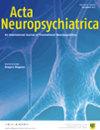Effects of erythropoietin on body composition and fat-glucose metabolism in patients with affective disorders.
IF 2.5
4区 医学
Q3 NEUROSCIENCES
引用次数: 10
Abstract
Abstract Background Erythropoietin (EPO) has been suggested to improve metabolism and also cognition, but human studies are scarce. This randomised controlled trial aimed to investigate whether EPO treatment influences body composition and fat and glycated haemoglobin (HbA1c) and fasting glucose, and whether these changes would be associated with previous observed cognitive benefits of EPO. Method In total, 84 non-obese patients with treatment-resistant unipolar depression or bipolar disorder in remission were randomised to 8 weekly EPO (40,000 IU) or saline (NaCl 0.9%) infusions in a double-blind, parallel-group design. Patients underwent dual X-ray absorptiometry scans at baseline and week 14 (6 weeks after treatment completion). Cognitive measures were assessed and fasting levels of cholesterol, lipoprotein fractions, triacylglycerides, glucose and HbA1c were obtained at baseline, week 9 and follow-up week 14. Results In total, 79 patients had complete pre- and post-treatment data (EPO: N=40, saline: N=39). EPO had no cumulative effect on body composition and markers of fat metabolism. The EPO-treated group exhibited significantly lower HbA1c levels after 8 weeks treatment [F(1, 80)=8.51, p=0.005], however, 6 weeks after treatment termination a significantly higher fasting glucose levels [F(1, 79)=5.85, p=0.02] and HbA1c levels [F(1, 79)=5.85, p=0.02] were seen. The latter increase in HbA1c was further significantly correlated with a better cognitive outcome on verbal memory (r=0.25, p=0.03). Conclusion Repeated EPO infusions had no cumulative effect on body composition in this cohort of patients with affective disorders, however, EPO modulated HbA1c and fasting glucose and this was associated with patients’ improvement of verbal memory.促红细胞生成素对情感性障碍患者体成分及脂糖代谢的影响。
背景:促红细胞生成素(EPO)被认为可以改善代谢和认知,但人体研究很少。本随机对照试验旨在研究促生成素治疗是否影响体成分、脂肪、糖化血红蛋白(HbA1c)和空腹血糖,以及这些变化是否与先前观察到的促生成素的认知益处有关。方法:采用双盲、平行组设计,共84例治疗难治性单极抑郁症或双相情感障碍缓解期非肥胖患者随机分为8周EPO (40000 IU)或生理盐水(NaCl 0.9%)输注组。患者在基线和第14周(治疗完成后6周)接受双x线吸收仪扫描。在基线、第9周和随访第14周时评估认知测量,并获得空腹胆固醇、脂蛋白组分、甘油三酯、葡萄糖和糖化血红蛋白水平。结果:共有79例患者有完整的治疗前后数据(EPO: N=40,生理盐水:N=39)。EPO对体成分和脂肪代谢指标无累积效应。epo治疗组在治疗8周后HbA1c水平显著降低[F(1,80)=8.51, p=0.005],但在治疗结束6周后,空腹血糖水平[F(1,79)=5.85, p=0.02]和HbA1c水平显著升高[F(1,79)=5.85, p=0.02]。后者的HbA1c升高与更好的言语记忆认知结果进一步显著相关(r=0.25, p=0.03)。结论:在这组情感性障碍患者中,反复输注EPO对身体成分没有累积影响,但EPO调节了HbA1c和空腹血糖,这与患者言语记忆的改善有关。
本文章由计算机程序翻译,如有差异,请以英文原文为准。
求助全文
约1分钟内获得全文
求助全文
来源期刊

Acta Neuropsychiatrica
NEUROSCIENCES-PSYCHIATRY
自引率
5.30%
发文量
30
期刊介绍:
Acta Neuropsychiatrica is an international journal focussing on translational neuropsychiatry. It publishes high-quality original research papers and reviews. The Journal''s scope specifically highlights the pathway from discovery to clinical applications, healthcare and global health that can be viewed broadly as the spectrum of work that marks the pathway from discovery to global health.
 求助内容:
求助内容: 应助结果提醒方式:
应助结果提醒方式:


